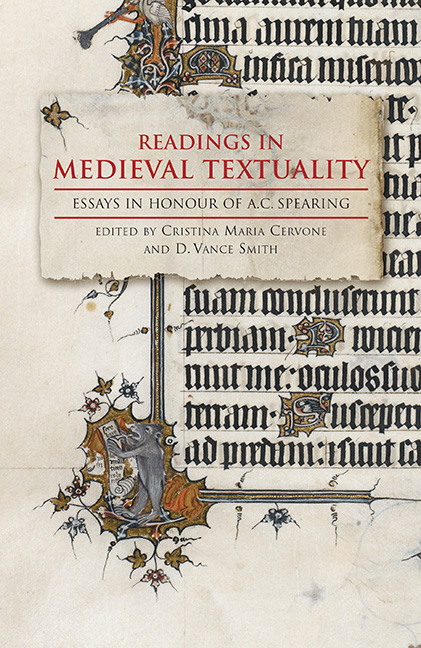Book contents
- Frontmatter
- Contents
- List of Illustrations
- List of Contributors
- A. C. Spearing's Work and Influence
- Bibliography of A. C. Spearing's Works
- I Reading Experience and Experientiality
- 1 The Wife of Bath's “Experience”: Some Lexicographical Reflections
- 2 The Proximity of the Virtual: A. C. Spearing's Experientiality (or, Roaming with Palamon and Arcite)
- 3 Makyng and Middles in Chaucer's Poetry
- II Revisions and Re-visioning of Alliterative Poetry
- III Subjectivity and the Self
- IV Reading for Form
- V Epilogue
- Works Cited
- Index
- Tabula Gratulatoria
1 - The Wife of Bath's “Experience”: Some Lexicographical Reflections
from I - Reading Experience and Experientiality
Published online by Cambridge University Press: 25 October 2017
- Frontmatter
- Contents
- List of Illustrations
- List of Contributors
- A. C. Spearing's Work and Influence
- Bibliography of A. C. Spearing's Works
- I Reading Experience and Experientiality
- 1 The Wife of Bath's “Experience”: Some Lexicographical Reflections
- 2 The Proximity of the Virtual: A. C. Spearing's Experientiality (or, Roaming with Palamon and Arcite)
- 3 Makyng and Middles in Chaucer's Poetry
- II Revisions and Re-visioning of Alliterative Poetry
- III Subjectivity and the Self
- IV Reading for Form
- V Epilogue
- Works Cited
- Index
- Tabula Gratulatoria
Summary
Experience is an interesting word, and has been so since it was first introduced into English in the fourteenth century. It has always seemed to stand at some blurry threshold of meaning between knowledge of the world as it is based on individual things that we have observed or that have happened to us, and our understanding that such knowledge is the sum of the meanings that we have attached to such things. (It is very difficult, as will be readily apparent, to define the meaning of experience without using the word experience.) The distinction is often made clear in modern English by the use of the plural in the first category of meaning (the plural is very rare in Middle English – only two instances out of seventy cited in the Middle English Dictionary) and the singular in the second. So, at the margin, the word may refer to what one would wish to remember but sometimes to what one would rather forget. A teacher with wide experience is entitled to be as pleased with herself as an experienced plumber, but a teacher who came before us to recount her experiences in the classroom might sound as if she had had a fair number of bad ones. But on the whole, in the modern world, experience per se (without qualifying pejorative epithet) is a good thing to have had: the word does not stand in binary relation with something that is generally regarded as superior (like authority). Intuition would be its intuitive binary, but intuition would not be a naturally preferable alternative, and the only opposite of experience, certainly not preferable, would be “lack of experience.”
The situation was more complicated in Chaucer's time, when the noun experience, recently introduced (the verb does not appear to come into use until the sixteenth century, and has no entry in the MED), appears able to stand at a different and highly significant threshold between the truth of faith and the truth of reason, and at some staging post in the movement from scholastic philosophy to scientific enquiry. I say “appears” since this is an over-excited version of what was actually happening.
- Type
- Chapter
- Information
- Readings in Medieval TextualityEssays in Honour of A.C. Spearing, pp. 3 - 14Publisher: Boydell & BrewerPrint publication year: 2016

